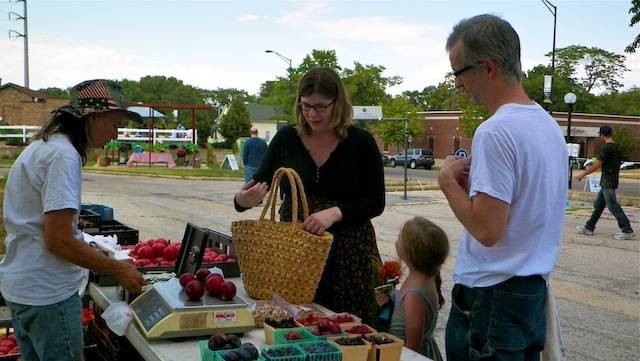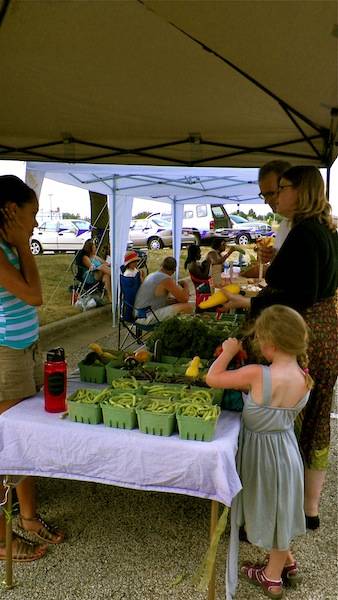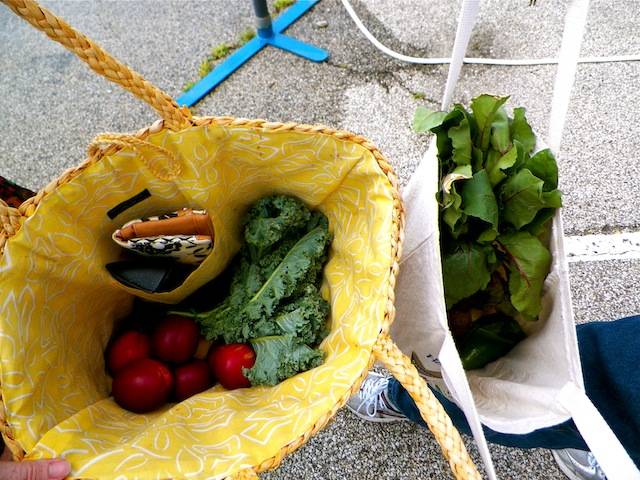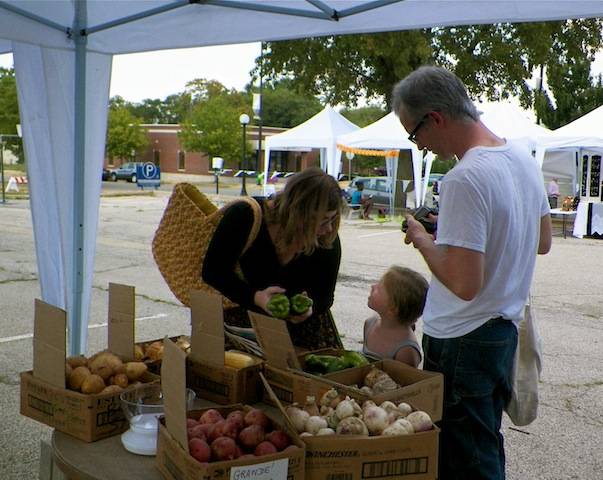After having gestational diabetes during her first pregnancy, Stefanie Smith of Urbana is watching her diet to make sure her current pregnancy goes well. She and her husband, Casey Coughlen, are vegan and, despite their nutritionist’s suggestions, plan to maintain the diet throughout the pregnancy. Even Smith’s five-year-old daughter, Miette, is a vegetarian and thinks eating meat is morally wrong.
Smith, 28, and Coughlen, 32, decided to become vegan in June 2011. In other words, they avoid all animal byproducts from dairy and eggs to honey. Like other vegans, they believe their diet is the healthiest and most ethical option.

Modern agriculture production methods have many people worried. The Food and Drug Administration reported using more than 29 million pounds of antibiotics for livestock in 2009. Children carry the highest levels of a pesticide associated with nerve damage, according to The Pesticide Action Network North America. Commercially available foods are often genetically modified, which the Food and Agriculture Organization of the United Nations estimates is responsible for a 33 percent loss of the world’s biodiversity.
It is unclear how many people have tried or still follow a vegan or vegetarian diet, but a 2008 Harris Interactive Institute report commissioned by the Vegetarian Times estimates that vegans account for 0.5 percent of the population, or 1 million people; more than 7.3 million people are vegetarian. The popularity of books like The China Study and documentaries like Food, Inc. suggests that interest in the diets is growing. These resources depict commercial agriculture and the standard American diet as dangerous and inhumane for animals and workers, the environment, and consumers alike. The vegan diet has been promoted by celebrities and public figures like Natalie Portman, Alicia Silverstone, and Bill Clinton.
Dr. Manabu T. Nakamura, professor of biochemical and molecular nutrition at the University of Illinois at Urbana-Champaign (UIUC), said the vegan diet appears to be safe and may help reduce the chance of cardiovascular diseases. He said it has received enough attention that it will not disappear.
“Many alternative diets fade,” said Dr. Nakamura, “but the vegan diet will stay — whether for health reasons or ethical ones. I don’t think this is a fad.”
 Smith and Coughlen said they became vegetarian after researching about food production. They are both lactose intolerant and say the transition was easy. They do not buy materials from wool, leather, or silk. They go to vintage and second-hand stores and support companies with vegan and environmentally friendly missions and practices.
Smith and Coughlen said they became vegetarian after researching about food production. They are both lactose intolerant and say the transition was easy. They do not buy materials from wool, leather, or silk. They go to vintage and second-hand stores and support companies with vegan and environmentally friendly missions and practices.
Smith said they believe veganism works for them, but not for all beings.
“For instance, our cat’s not vegan,” said Smith. “I know that sounds weird but there are people out there putting their cats on a vegan diet.” She said this is wrong because cats are omnivores and need to eat meat to survive.
“My personal ethos is such that I’m not going to harm my cat to not harm other animals,” said Smith.
Smith said her daughter decided to stop eating meat after seeing an educational program on dinosaurs. According to Smith, Miette did not understand why the dinosaurs ate each other if people didn’t eat each other. It made her uncomfortable and scared, said Smith.
“I’ve been vegetarian since I was four,” said Miette, who attends preschool at the Child Development Laboratory in Urbana. “I have vegetarian friends at school and we eat vegetarian lunches the school makes for us.”
Most of the time, the family cooks at home using several kitchen appliances that help them prepare commercial-like meals in their own kitchen. Among these appliances is a dehydrator. Most dehydrators range anywhere from $100 to $300 dollars, but Smith said it was a worthwhile investment.
“It actually allows us to have some foods all year,” said Coughlen, reaching for a jar labeled roasted garlic. He opened the lid and revealed a dark green powder in the container.
“It’s kale powder,” he said, tightening the lid back on the jar. “And it’s nutrient dense year-round.”
They buy the kale when it is in season, tear the leaves off the stalk, and dry them in the dehydrator on a low setting. They then grind the crispy leaves in a coffee grinder to get kale powder, which they sprinkle into dressings and on foods.
Coughlen grabbed another container and opened it slowly.
“Careful,” he said, squinting his eyes, as if in pain. “I made the mistake of taking a big whiff of this one once. Bad idea.”
Inside was a deep red powder that immediately released a spicy, earthy odor. It is one of their favorite seasonings — dehydrated ground peppers.
Using the dehydrator, they have made snacks like zucchini and kale chips, lightly seasoned with sea salt, and dried fruit. The couple says dehydrating foods themselves gives them control over seasonings.

Their Vitamix also gets daily use. It is a powerful blender with a special tool that helps the contents blend more quickly and evenly. There are five models of Vitamix blenders, ranging from $450 to $650 dollars per unit. Coughlen said he had been making smoothies for a long time but was never satisfied with the blenders. They decided to upgrade to a Vitamix after learning they would have a baby together.
“Pregnant women need a lot of nutrition,” said Smith, “and you can make so many things so quickly with this, from smoothies to soups and even baby food.”
They said the Vitamix is quick and easy. After prepping the ingredients, a meal is ready in less than a minute; it takes them just another 30 to 60 seconds to clean the machine. Smith said they also make their own hygienic and household products. She opened a clear jar with a wide lip, pressed her fingers against the solid white contents and rubbed her fingers together.
“Coconut oil,” she said. “I just rub a little between my fingers before applying it to my skin and I’m good to go.” She said she mixes cold-pressed, extra virgin coconut oil with essential oils and cornstarch for fragrance and a drying effect. Homemade deodorant that’s safe and effective, she said.
They couple swears that the best degreaser in the world is lemon juice and baking soda spray. Smith added that keeping chemical cleaners away from her kids gives her peace of mind.
“She’s been good about not looking for trouble,” said Smith, “but this way I know I’m not sending her to work or play in a haze of chemicals.”
Just a few blocks from their house is Common Ground Co-Op in Urbana, where they have a membership and get most of their groceries. They go to websites like Vitacost, the Vegan Shop, and Pure Citizen for supplements and specialty items.
Miette isn’t entirely vegan, though. At home, she eats vegan, but her parents allow her to consume dairy outside the house. Like many children, Miette is a picky and random eater. She likes sprouted wheat bread, broccoli, and carrots, but can’t stand Brussels sprouts or tomatoes.

“She’s mainly vegetarian, rather than vegan, because of her biological father,” said Smith.
“Right now she likes dairy, and we’re okay with that.”
Miette visits her biological father, Chris Golwitzer, on weekends. Smith and Golwitzer were in a four-year relationship that ended a couple years after Miette was born.
Golwitzer, 34, picks Miette up for weekends at his home in East Peoria. Miette has three dinners, two breakfasts, and two lunches with Golwitzer and his girlfriend, who are neither vegan nor vegetarian.
“When Miette became vegetarian, there was no precursor,” he said. “It caught me by surprise, but I’m happy to know she is intuitive and influenced by smart adults.”
Golwitzer grew up in Lincoln, Illinois, a small town about 30 minutes from Champaign. He said neither of his parents ate a lot of vegetables so neither did he.
“Growing up, apples and bananas were about as healthy as my snacking got,” said Golwitzer, who used to consume a lot of soda and sugary fruit juices, cookies, bagged chips, and ice cream.
He adds that the rural community of roughly 12,000 at the time was not a portrait of cultural diversity. Miette is exposed to many more cultures, foods, lifestyles, and attitudes at her school, he said.
Golwitzer, who supported himself as a musician for several years, is studying renewable energy at Illinois State University in Normal, Illinois. He plays in an alternative rock band, which is what initially introduced him to niche diets like vegetarianism and veganism.
“Being in a band, playing music, and going on tours brought me to a lot of underground places,” said Golwitzer. “They wouldn’t give us a lot of money, but they fed us, and a lot of it was ethnic and alternative.”
He said he now makes better shopping decisions and gets most of his groceries from a local health foods store or the farmer’s market. He attributes the change in his habits to a more adventurous palette, steadier employment, and better income. He said Miette’s vegetarianism has also pushed him to cook more vegetables.

“I try to be ethical,” added Golwitzer, who buys organic produce, milk, and free-range eggs. “It would be easier to sustain a culture on grains than on meat, and I envision that I will eventually attempt to stop eating meat.”
By Sunday evening, Miette is back in Urbana with her mother and stepfather, Casey Coughlen, a Ph.D. candidate in linguistics at UIUC. Coughlen grew up in Joliet, Illinois, a suburb of Chicago.
“It’s a town known for its prison, race track, and gambling,” said Coughlen.” It was the trash can of Chicago, and it reeked of sewage and fast food.” Chicago’s sewage dried up on the way to Joliet, and while that is now canalled, he said the town still smells.
Coughlen said he grew up with no dietary restrictions and ate diverse, even bizarre meals. “My mom would get the weirdest things,” he said. “We tried stuff like shark meat and beef tongue. At one point I think we even had hooves.”
He said his family did not, however, eat convenience meals and said he was surprised to learn how differently his friends ate.
“Their basements were like convenience stores,” he said. “They were just full of junk food. That was bizarre to me, but apparently it’s a lot more normal than I thought.”
Stefanie Coughlen grew up 30 minutes from Champaign in Leroy, Illinois. She said she tried vegetarianism at 10 years old, but that her parents revoked her meatless privileges when the bulk of her diet became French fries and chocolate. After her mother made her visit the library to research vegetarianism, Smith remained vegetarian until she was 18 years old.
One of the biggest reasons she did not eat meat was to save money — it was just another expense she did not really need, especially once she started earning her own bread at the age of 16.
Smith did not graduate from high school. When she was 16, her parents co-signed a lease so she could live on her own.

“I look back at it and think it’s insane,” she said, “but at the time it seemed normal and it had to be done.” She said mental and emotional problems inundated her home to the point that they had no stable domestic life: “My parents weren’t exactly reliable and couldn’t take care of themselves, let alone me.”
Smith’s father, a bipolar schizophrenic, and her mother, who struggled with drug and alcohol problems, eventually separated. Smith did not have other family to turn to, but she communicated with parents and friends for support.
“I didn’t feel forced to grow up,” she said. “It’s growing with parents who have mental illnesses that makes you mature — and it’s a more subtle change.”
When she turned 18, she and her then boyfriend visited Thailand, where they tried everything from bugs and grasshoppers to scorpions and silkworms. She said she was experimental and forgot about animal compassion since everyone around her was eating meat. By 2009, she was single again and met Coughlen. A year later, they married and are expecting a baby boy in July. Coughlen said he never considered having kids until he met Smith and Miette. The July baby will be his first child.
Smith is full-term and expecting the baby any moment. She said she has been taking precautionary measures to avoid getting gestational diabetes again.
“I have to really watch out for carbs,” said Smith. “Even chickpeas are high in carbs! So there goes my hummus,” she said, laughing.
Smith, who graduated in May with a bachelor’s degree in linguistics from UIUC, said she plans to take a year off to take care of the baby and look into graduate linguistics programs. In the meantime, she is taking supplements and multivitamins to ensure there are no holes in her diet and that the baby is healthy.
“We fully expect our child to be vegan,” said Smith. “At some point, he will have to choose for himself, and that’s fine. Until that time comes, we’ll keep doing what we think is right for ourselves and the environment — and that’s being vegan.”
~~*~~








